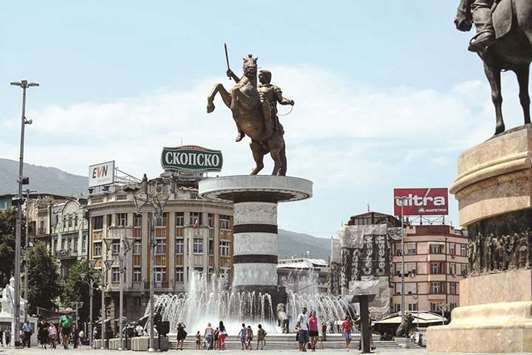When Macedonia declared independence in 1991, the new country chose a name that evoked the past glories of its most famous claimed son, Alexander the Great.
But nearly three decades on, the decision to use the name of the ancient kingdom ruled by a general who once conquered half of known civilisation is hampering the fledgling nation’s place in the modern world.
Macedonia, a former Yugoslav republic home to some 2.2mn people, has fought since its inception with neighbouring Greece over the name it shares with a northern Greek province.
Many Greeks fear the use of the name suggests Skopje may harbour territorial ambitions.
What started as a tug-of-love over a 2,400-year-old ruler – a source of great pride for both nations – has morphed into a charged political dispute holding back Skopje’s efforts to join the European Union and the North Atlantic Treaty Organisation (Nato).
Athens, a member of both, has so far blocked the bids over the name issue.
“There is no other way to join Nato without solving the name issue,” the military alliance’s chief Jens Stoltenberg said this week on a visit to the Macedonian capital.
Known as the Former Yugoslav Republic of Macedonia (FYROM) at the United Nations, the country elected a new government last year offering some hope of a breakthrough.
Replacing a nationalist, right-wing administration, the new ruling Social Democrats relaunched talks with Athens in a bid to settle the dispute.
This week a UN envoy said he is “very hopeful” that a solution was in reach, while Macedonia’s Prime Minister Zoran Zaev said the row could be ended “by the end of the first quarter of 2018”.
But Macedonians themselves are split over whether changing the name of their homeland is too high a price to pay to join the world’s largest single market and defence alliance.
Macedonia’s ethnic Albanian minority has applauded moves towards a compromise.
But other Macedonians, mainly ethnic Slavs, are less enthusiastic.
“I’m Macedonian! How can something like this (the country’s name) be changed?” said Done Stojanoski, a retired shopkeeper.
“Why don’t they change the name of Americans?” the 67-year-old added.
As Greek nationalist groups mobilise for mass demonstrations this weekend, a raft of not particularly catchy alternative names is circulating.
These include: Upper Macedonia, Northern Macedonia, New Macedonia, or Macedonia-Skopje.
“No, no!” said Zlatko Andreevski, a 32-year-old farmer from the central town of Prilep. “What would I call myself, northern-Macedonian? It doesn’t suit me.”
Public opinion is hard to accurately gauge but a survey carried out in June 2016 showed that more than one-third of Macedonians want to join both the EU and Nato.
However, nearly 65% of those polled were against changing Macedonia’s name.
Liljana Stoilova, a 43-year-old vegetable farmer, would accept being a citizen of “Northern Macedonia as long as we remain Macedonians and our language remains Macedonian”.
But in a nation experiencing a mass exodus of young professionals and with an average monthly salary of €350 ($430), pragmatism among some Macedonians comes before patriotism.
Accepting the name change “would give us priority to enter both Nato and EU. Politicians have to settle this”, said Gani Rahman, 49, an ethnic Albanian waiter.
It is unclear how a name change would work in practice.
One outstanding issue is whether the new name would be used internationally or just domestically, and in official correspondence or not.
Another is the amount of facilities and landmarks named after Alexander the Great.
Nano Ruzin, a political scientist who served as Macedonia’s ambassador to Nato, said Skopje’s international airport would probably need renaming after any deal.
“Some changes are necessary from an aesthetic point of view,” he said, including several neo-classical monuments in the capital.
Ali Amethi, a former leader of an ethnic Albanian political party said that some monuments would need removing entirely.
While he is in favour of a name change, he believes there should be some red lines.
“For (ethnic) Albanians, the names of the Slav Republic or the National Republic of Macedonia would be unacceptable,” Amethi said.

A picture taken on July 23, 2012 shows a bronze statue of Alexander the Great, officially named ‘Warrior on a Horse’, in Skopje’s central Macedonia Square.
